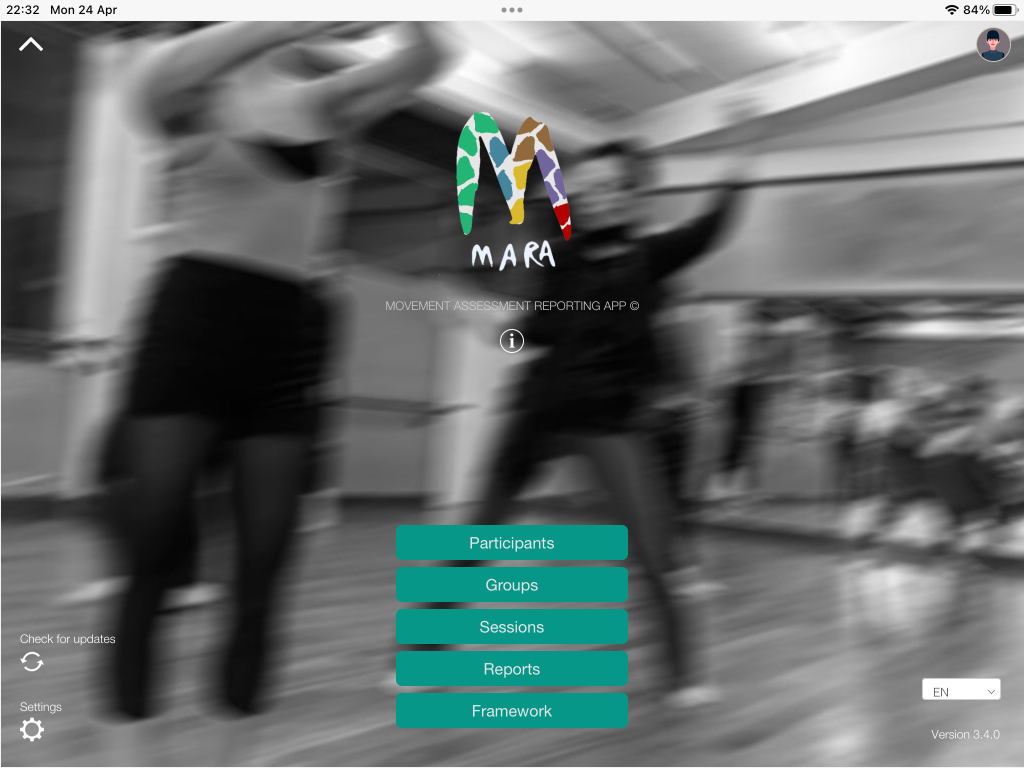ABOUT MARA: Movement Assessment and Reporting App
MARA is the world’s first iPad app for dance movement therapy assessment. MARA provides a theoretically supported, methodologically sound tool for planning and assessment that is practical and easy for DM therapists to use. This portable assessment tool enables gathering and systematising of data and export into user-friendly reports.
mara VERSION 3.4 AVAILABLE HERE
Our app MARA, is ready for use. Version 3.4 includes an expanded range of outcomes; new security, graphing and export features; cleaner design and more, developed after trials and user-feedback. It also has new options for exporting individual and group data and to creating backups in your clouds, such as Dropbox, GoogleDrive, OneDrive or iCloud. You can now choose between three languages in the app.
WHY USE MARA
MARA is an assessment tool for dance movement therapy, developed in response to a range of formal and informal trials with DMT practitioners and users. MARA is intended to facilitate more regular and efficient assessment than is possible with paper-based processes that need additional work to process into reports. MARA has been developed to help dance movement and other creative arts therapists support clients better, by strengthening their capacity to assess clients’ progress. MARA supports evidence-informed practice by enabling the creation and use of data about clients to inform practice decisions, from planning right through to completion of therapy. MARA also offers a range of assessment modalities: quantitive, qualitative, media (photos, video, voice recording and drawings) with all of these options available for client self assessment. MARA provides quantitative data in a range of graphed forms, and reporting templates using all of these forms of data.
How mara works
MARA is simple to use. The app technology allows therapists to assess as they go with no paper, pens or sitting down required. Therapists just tap the screen to record quantitative scores on assessment scales provided, as many times in a session as their assessment protocol demands. The app turns the tap into data, which is collated into table and graphic form automatically. No more laborious transcription of data from notes to computers to assessment reports! This feature is supported by options for note taking through typing or voice recording, and a range of other assessment options including photos, videos and drawing.
MARA’s features
MARA includes a range of features to support dance movement therapists assess clients’ progress securely, accurately, and comprehensively. These include security options, client information storage, attendance recording functions, data gathering and exporting options, and more.
OUTCOMES FRAMEWORK
MARA’s assessment process is based on the Outcomes Framework for Dance Movement Therapy (Dunphy, Lebre & Mullane, 2020), developed especially for dance movement therapy. Therapists select therapeutic domains and goals to assess each session or program from a comprehensive range encompassing physical, cultural, emotional, cognitive, social and integration. This Framework is continually being improved through research of the literature and consultation with practitioners, with trials underway to test its validity and reliability underway. Read more.
who could use mara?
Dance movement therapists working with clients across the lifespan, in diverse settings including community based, agency and institutional locations, and in schools, aged care, mental health and disability services, counselling and psychotherapy, recreation and health and wellbeing programs, can use MARA. Assessment elements prioritise use of plain language as far as possible, to enable assessment results to be understood by program managers, funders, and clients themselves.
WHY WAS mara DEVELOPED?
MARA was developed by Australian dance movement therapists Kim Dunphy and Sue Mullane to address identified needs of their profession of dance movement therapy for practical assessment options. More about why here.
how was mara developed?
MARA has been in development since 2010, with theoretical research, technical development, professional feedback and user trials providing the development team with ongoing input to make the tool most useful. Read more here
Awards
We’re pleased that our work developing MARA has been acknowledged in two awards, for Innovation in Dance Movement Therapy, American Dance Therapy Association (2015), and Outstanding Presentation, Excellence in Professional Practice Conference, Australian Council of Educational Research (2014). An article on the application of MARA (Dunphy & Hens, 2018) was acknowledged with the American Dance Therapy Association’s Research Award in 2019.
Acknowledgements
Support for MARA’s development and trialling has been provided by:
Funding: the University of Melbourne, including a Mackenzie Post-Doctoral Fellowship for project leader Kim Dunphy, an MSEI Community Fellowship for Tessa Hens of Bayley House, Brighton and a VCA Engagement Grant; the Australia-Germany Joint Research Co-operation Scheme, (DAAD); PACFA (Psychotherapy and Counselling Federation of Australia) and an anonymous charitable foundation; and the Hanny Exiner Memorial Fund (of the Dance Movement Therapy Association of Australasia).
In-kind support: Faculdade de Motricidade Humana (FMH) – Universidade de Lisboa (ULisboa) and INET-MD, Instituto de Etnomusicologia – Centro de Estudos em Música e Dança-Pólo da FMH – Portugal for Dr. Paula Lebre’s contribution; Almada City Council for the support of Emilia Prudencio and Soraia Juma in the first Portuguese trial (2017/18); Agrupamento de Escolas de Abação, MOSAICO – Plataforma de Projetos Inclusivos Artísticos e Educativos, Inpulsar and Patchwork Projects as current trial sites; and Whatdesign for the logos design; RIArt, Alanus/Bonn Hochschule, Germany for the contribution of Professor Sabine C. Koch and SRH Hochschule, Heidelberg, for the support of post-graduate students Simea Schoenenberger (M.A.) and Josephine Geipel (M.A.); Bayley House, Melbourne, Australia for the time of Tessa Hens, staff, clients and as a trial site; Columbia College, Chicago, for the time of staff Professor Susan Imus and Laura Allen and post-graduate students Patrick Justin and Hannah Bailey as triallers; Sunshine Special Developmental School, Melbourne, Australia for the work of Sue Mullane, staff, students and families as a trial site; and hundreds of dance movement and other creative arts therapists in Australasia and internationally.
Developers: Arnis Gross, of fmCustomApps and Advaita Digital (Frank Ryder and Dennis Claringbold).
